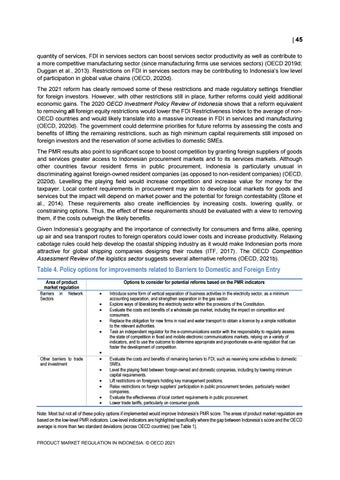45 quantity of services, FDI in services sectors can boost services sector productivity as well as contribute to a more competitive manufacturing sector (since manufacturing firms use services sectors) (OECD 2019d; Duggan et al., 2013). Restrictions on FDI in services sectors may be contributing to Indonesia’s low level of participation in global value chains (OECD, 2020d). The 2021 reform has clearly removed some of these restrictions and made regulatory settings friendlier for foreign investors. However, with other restrictions still in place, further reforms could yield additional economic gains. The 2020 OECD Investment Policy Review of Indonesia shows that a reform equivalent to removing all foreign equity restrictions would lower the FDI Restrictiveness Index to the average of nonOECD countries and would likely translate into a massive increase in FDI in services and manufacturing (OECD, 2020d). The government could determine priorities for future reforms by assessing the costs and benefits of lifting the remaining restrictions, such as high minimum capital requirements still imposed on foreign investors and the reservation of some activities to domestic SMEs. The PMR results also point to significant scope to boost competition by granting foreign suppliers of goods and services greater access to Indonesian procurement markets and to its services markets. Although other countries favour resident firms in public procurement, Indonesia is particularly unusual in discriminating against foreign-owned resident companies (as opposed to non-resident companies) (OECD, 2020d). Levelling the playing field would increase competition and increase value for money for the taxpayer. Local content requirements in procurement may aim to develop local markets for goods and services but the impact will depend on market power and the potential for foreign contestability (Stone et al., 2014). These requirements also create inefficiencies by increasing costs, lowering quality, or constraining options. Thus, the effect of these requirements should be evaluated with a view to removing them, if the costs outweigh the likely benefits. Given Indonesia’s geography and the importance of connectivity for consumers and firms alike, opening up air and sea transport routes to foreign operators could lower costs and increase productivity. Relaxing cabotage rules could help develop the coastal shipping industry as it would make Indonesian ports more attractive for global shipping companies designing their routes (ITF, 2017). The OECD Competition Assessment Review of the logistics sector suggests several alternative reforms (OECD, 2021b).
Table 4. Policy options for improvements related to Barriers to Domestic and Foreign Entry Area of product market regulation Barriers Sectors
in
Network
Options to consider for potential reforms based on the PMR indicators
Other barriers to trade and investment
Introduce some form of vertical separation of business activities in the electricity sector, as a minimum accounting separation, and strengthen separation in the gas sector. Explore ways of liberalising the electricity sector within the provisions of the Constitution. Evaluate the costs and benefits of a wholesale gas market, including the impact on competition and consumers. Replace the obligation for new firms in road and water transport to obtain a licence by a simple notification to the relevant authorities. Task an independent regulator for the e-communications sector with the responsibility to regularly assess the state of competition in fixed and mobile electronic communications markets, relying on a variety of indicators, and to use the outcome to determine appropriate and proportionate ex-ante regulation that can foster the development of competition. . Evaluate the costs and benefits of remaining barriers to FDI, such as reserving some activities to domestic SMEs. Level the playing field between foreign-owned and domestic companies, including by lowering minimum capital requirements. Lift restrictions on foreigners holding key management positions. Relax restrictions on foreign suppliers’ participation in public procurement tenders, particularly resident companies. Evaluate the effectiveness of local content requirements in public procurement. Lower trade tariffs, particularly on consumer goods.
Note: Most but not all of these policy options if implemented would improve Indonesia’s PMR score. The areas of product market regulation are based on the low-level PMR indicators. Low-level indicators are highlighted specifically where the gap between Indonesia’s score and the OECD average is more than two standard deviations (across OECD countries) (see Table 1). PRODUCT MARKET REGULATION IN INDONESIA: © OECD 2021


